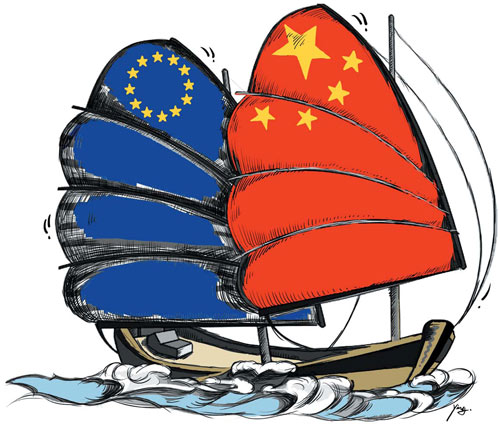US attempt to wage a new 'Cold War' a massive assault on human rights


I was in Berlin on Tuesday for the 2024 China-Europe Seminar on Human Rights, an event that was first held in 2015, and has been hosted every year by European and Chinese cities since then.
While this year's theme was "new and emerging rights in the age of digital technology, artificial intelligence, environmental degradation and climate change", many experts voiced their concerns over the ongoing conflicts that are a threat to humankind, especially the people in the countries directly affected and their human rights.
The conflicts include those between Russia and Ukraine, and Israel and Palestine. Some say there is a new "Cold War" the United States is trying to wage against China. Many are worried that these hot and cold wars, if left unchecked, could potentially trigger a nuclear war.
Despite US President Joe Biden's public statement that Washington does not seek a new "Cold War", what his administration has been doing against China over the past years constitute a new "Cold War". That was the view of some of the experts who spoke at Tuesday's seminar.
True, the new "Cold War" Washington is attempting to wage is not the same as the Cold War between the US and the Soviet Union, when the two sides had almost no trade relations and very limited people-to-people exchanges. But the US has been moving in that direction since former US president Donald Trump reversed decades of US policy on China. Worse, the Biden administration has doubled down the China-containment policy of the previous administration in a bid to curtail China's rise.
Such Cold War mentality has made everyone worse off. Trump's tariffs on Chinese exports, which Biden vowed to revoke during the 2020 presidential campaign but broke his promise after assuming office, have increased the prices of commodities for US consumers, according to various US studies.
The Peterson Institute for International Economics on Monday warned that if Trump wins the presidential election and carries out his latest threat to impose 10 percent tariffs on foreign goods and 60 percent on Chinese goods, the US economy would suffer the most, with its GDP sinking to 2.82 or 9.65 percent lower than the baseline by 2028, based on two scenarios of whether foreign countries retaliate or not.
In contrast, China's GDP would slide by only 0.5 to 0.74 percent below the baseline by 2028 and Mexico's GDP by 0.03 to 0.56 percent.
Similarly, the US tech war against China is set to backfire because it deprives US tech companies of their biggest customer, and encourages China to invest and innovate more aggressively to catch up with the West and become self-reliant in advanced technology.
The notorious Wolf Amendment, a law passed by US Congress in 2011 to prohibit US government cooperation with China in space science has failed to halt China's space mission. Instead, it has prompted China to make a giant step forward in space exploration.
China has been following a win-win policy since the launch of reform and opening-up in 1978, by welcoming more foreign investment. It's hard to figure out why the US, still a superpower in many aspects, has become so narrow-minded and so obsessed with lose-lose games with the sole aim of hurting the Chinese economy, which has been a major engine for global economic growth for years.
Axel Hegwein, chairman of the supervisory board of the German-Chinese Culture Foundation, reminded people at Tuesday's seminar that Berlin is a place of historic significance, a place that connects the East and the West. He said he expected more such discussions and exchanges to be held so that the two sides can learn more about human rights from each other.
He was clearly referring to the fact that Berlin, in fact Germany, was divided into two parts during the Cold War. The same was true for Europe.
There is no better place to oppose the new Cold War than in Berlin. I am writing this column in my hotel, just 350 meters from Checkpoint Charlie, which witnessed the untold sufferings of the German people during the Cold War. But it's doubtful whether the US will understand the message.
The author is chief of China Daily EU Bureau based in Brussels.

































